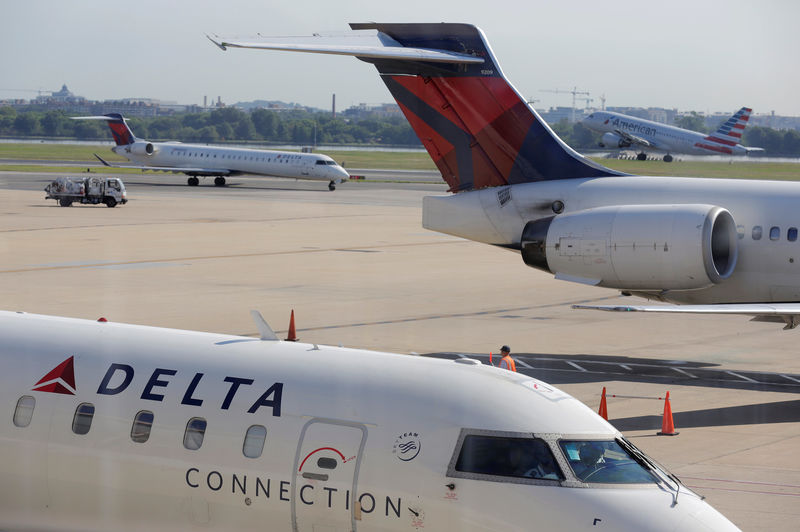Walmart halts H-1B visa offers amid Trump’s $100,000 fee increase - Bloomberg
On Monday, Evercore ISI made an adjustment to Delta Air Lines’ (NYSE:DAL) financial outlook, reducing the price target from the previous $80.00 to $70.00, while continuing to endorse the stock with an Outperform rating. The adjustment comes amid a backdrop of increased policy uncertainty and recent tariff announcements that have intensified market unpredictability and impacted corporate travel behavior. According to InvestingPro data, Delta’s stock has declined over 14% in the past week alone, now trading at a modest P/E ratio of 6.9, suggesting potential undervaluation relative to its Fair Value.
The firm’s analyst, Duane Pfenningwerth, noted that the uncertainty surrounding policy decisions had already begun to affect corporate travel activity by early March. The situation was exacerbated by last week’s tariff announcements, which led to a significant downturn in the stock market and heightened volatility. Such market conditions typically result in a temporary halt in booking and decision-making activities within the travel sector. Despite these challenges, InvestingPro analysis shows Delta maintains a "GOOD" overall financial health score, with particularly strong marks in relative value and profitability metrics.
Pfenningwerth elaborated on the potential implications of the current market sentiment, suggesting that the decline, if sustained, could become a self-fulfilling prophecy, further dampening travel demand. However, the analyst also expressed a cautiously optimistic view that peak tariff uncertainty might diminish, with possible deals and solutions emerging in time to prevent a deep recession.
The key factor, according to Pfenningwerth, is the duration of the current standstill in travel-related activities. The length of this pause, induced by the combination of policy uncertainties and market reactions, is considered critical in assessing the future financial performance of Delta Air Lines.
Delta Air Lines, along with the broader travel industry, is facing challenging conditions as it navigates through the current economic landscape marked by policy changes and market fluctuations. The revised price target reflects these concerns while still recognizing the company’s potential for outperformance in the longer term.
In other recent news, Delta Air Lines has adjusted its profit forecast for the first quarter of 2025, citing a decrease in travel demand and higher fuel costs. The company now expects revenue growth between 3% and 4%, down from the previously anticipated 7% to 9%. Delta has also revised its earnings per share guidance to a range of $0.30 to $0.50, which falls short of both the consensus estimate and UBS’s previous projection. UBS responded by lowering Delta’s stock price target to $77 from $90, while maintaining a Buy rating. The airline attributes approximately half of its revenue shortfall to a weaker economic environment and the other half to disruptions from recent plane accidents and weather-related issues.
Additionally, Delta’s announcement has impacted the broader travel industry, leading to a significant downturn in travel and hospitality stocks. Notably, American Airlines (NASDAQ:AAL) has also reduced its revenue expectations, now projecting a loss of up to 80 cents per share for the first quarter. This adjustment comes amid a broader trend of lowered profit forecasts among major U.S. airlines, including Southwest Airlines (NYSE:LUV), which has introduced new checked-bag fees to enhance revenue. Despite these challenges, Delta reports strong booking numbers for April and May, with robust trends in premium and international travel, indicating potential recovery in these segments.
This article was generated with the support of AI and reviewed by an editor. For more information see our T&C.
